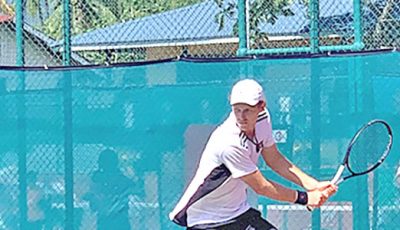Rahman wants a new trial
One of the three men who were convicted of bringing Bangladeshi men to Saipan on promises of nonexistent jobs and green cards in exchange for cash wants to be acquitted and is demanding a new trial.
In a motion made by his lawyer, Robert T. Torres, Muksedur Rahman said the U.S. government failed to show enough evidence at trial that he had intended to commit mail fraud and fraud in foreign labor contracting.
Rahman, a welder by profession, was one of three men convicted of charges arising from a scheme to defraud Bangladeshi men by promising them good-paying jobs in the U.S. as well as green cards.
Last Oct. 18, a federal jury found Rahman guilty of two counts of mail fraud and three counts of fraud in foreign labor contracting.
A co-defendant, businessman David Trung Quoc Phan, was found guilty of two counts of mail fraud, three counts of fraud in foreign labor contracting, and one count of fraud and misuse of visas and permits.
The third defendant, Md. Rafiqul Islam, a welder, was found guilty of one count of mail fraud and three counts of fraud in foreign labor contracting. Rahman and Islam are brothers.
The three are supposed to be sentenced on March 9, 2018.
U.S. District Court for the NMI designated Judge John C. Coughenour presided over the trial.
In Rahman’s motions, Torres said that Rahman’s actions did not rise to the level of participating in, let alone “masterminding,” the allegedly fraudulent scheme, so the guilty verdict is contrary to evidence and the evidence itself is not enough to sustain a conviction.
“The weight of the evidence with regard to the intent element of both charges is clearly against the verdict,” Torres said.
Therefore, Rahman should be acquitted of mail fraud and fraud in foreign labor contracting, he said.
Torres argued that Rahman warrants a new trial, citing prosecutorial errors during closing argument.
He said that the U.S. government shifted its burden of proof to Rahman and the other defendants when it argued during closing arguments that the defense could have called witnesses but did not.
This shifted the burden of proof from the prosecution to the defendant, thereby violating the defendant’s Fifth Amendment right not to testify, Torres said.
He said that Coughenour failed to instruct the jury to disregard the prosecution’s comments and failed to provide any curative instructions.
When the U.S. government pointed to the defendants’ children to elicit sympathy for the complaining witnesses, Torres said the U.S. government violated the “golden rule” by asking the jurors to place themselves in the shoes of the victims.
Torres said the verdict was built on the testimony of witnesses who not only lied to get here but developed a scam to stay here. Allowing Rahman’s guilty verdict to stand is contrary to law and the principle of justice, he said.
In the U.S. government’s opposition to Rahman’s motions, assistant U.S. attorney James J. Benedetto said there was ample evidence: both testimonial and documentary, from which the jury could find Rahman guilty beyond a reasonable doubt.
Benedetto said the remarks complained of were isolated, and did not undermine the fundamental fairness of the jury’s verdict.
Benedetto said the testimony of the U.S. government’s complaining witnesses established that Rahman had spoken with them while they were in Bangladesh and he was on Saipan, and that lied about their employment in the U.S.
Benedetto said the complaining witnesses also testified that they made cash payments to co-conspirators, and deposits directly to the bank accounts of Rahman’s sisters, Fahima Akter and Jahanara Begum, at Rahman’s direction.
Benedetto said co-defendant cooperator Zeaur Rahman Dalu testified about Rahman’s role in coordinating the recruitment of the complaining witnesses, and the amount of money (10 lahk taks, or roughly $12,000) that Rahman received from each of the two victims Dalu had recruited.
Benedetto said the bank records obtained from the government of Bangladesh corroborated deposits the complaining witnesses had been made to Fahima Akter’s account.
Fahima Akter is Rahman’s sister.
On the new trial issue, Benedetto noted that reference to children by the prosecutor was also invited by Torres.
He said during closing argument, Torres rhetorically asked the jurors why the government had not called “its star witness,” U.S. Department of Homeland Security resident agent-in-charge Mark Yamanaka.
Benedetto said in rebuttal he intended to respond that Yamanaka had a small child, and the child’s medical emergency had prevented the prosecution from calling Yamanaka as a trial witness.
Unfortunately, Benedetto said, he did not get right to the point and instead began by mentioning that the jurors had seen defendants’ children during the trial, and that others—including the victims—also had children, which drew an objection from Torres before he could explain Yamanaka’s medical emergency.
Benedetto said perhaps he could have been more articulate.
However, he said, his remarks complained of by Rahman were not so pronounced or persistent that they undermined the fundamental fairness of the trial.
Phan and Islam also asked the court to give them more time to file post-trial motions. The court granted their request to file until Nov. 15, 2017.
After the prosecution rested during the trial, Phan’s fiancée, Analyn Nunez and Rahman’s wife, Shahinur Akter, were acquitted. Defendant Zeaur Rahman Dalu pleaded guilty.

























